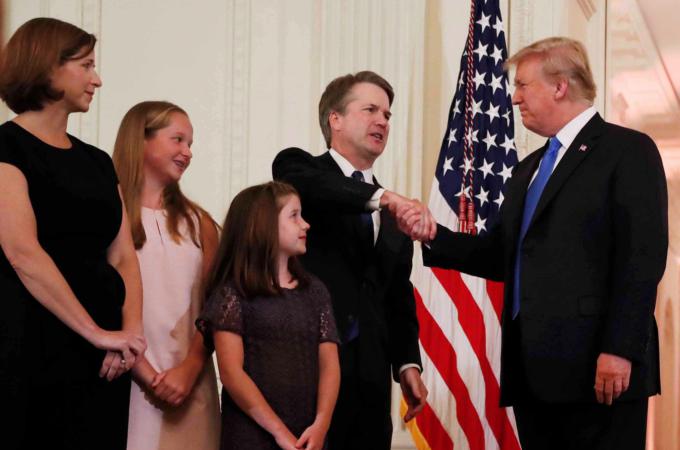What if Kavanaugh is confirmed?
Soon Washington will again be offering the world the spectacle of one of the things it does best (or worst): a contested Senate confirmation hearing. This time it will be Judge Brett Kavanaugh's turn to spend time on the rack in preparation for serving on the Supreme Court.
Kavanaugh, a Catholic and a parishioner at Washington's Blessed Sacrament parish, has spent the last twelve years on the U.S. Court of Appeals for the District of Columbia Circuit, frequently described as the nation's second most important court after the Supreme Court itself. There he earned a reputation as an able, conservative jurist well qualified for the position for which President Trump has nominated him.
But this is Washington, Trump named him, midterm elections are approaching, and the Democrats are still smarting at the way Senate Republicans dispatched Barack Obama's last Supreme Court nominee, Merrick Garland, by refusing even to hold hearings on his nomination. Kavanaugh will have to take his lumps before taking his seat. Live with it.
Let us suppose, however, that he is confirmed. What then? Conservatives are ecstatic at the prospect of a 5-4 Supreme Court majority. They may get it, but they will not get all that some seem to imagine where issues like abortion and same-sex marriage are concerned.
Take abortion. Social conservatives are itching for the reversal of Roe v. Wade, the 1973 decision that legalized abortion nationwide. But supposing that happens? The effect of overturning Roe will be simply to return the abortion issue to the states and let them deal with it.
This is highly desirable of course, but by no means does it mean the end of abortion in America. Some states will place stringent restrictions on the practice. Others will allow the present regime of abortion on demand to remain in place. In any case, the realistic prospect will be a continuation of this struggle in state legislatures for years to come--a great improvement over the present situation but hardly the abolition of abortion.
That is the even more likely result if, as seems entirely possible, the Supreme Court doesn't flatly overturn Roe v. Wade but instead adopts an incremental approach involving a green light for state limits on the reasons and circumstances for the performance of abortions. Again, a lot better than what we have now but not all that prolifers might hope.
As for same-sex marriage, the reversal of the 2015 Obergefell ruling that gay couples have a constitutional right to marry is similarly not in the cards. What can realistically be expected is a stronger affirmation of the right to refuse to cooperate with same-sex marriage than the Supreme Court delivered last term.
In that decision, Masterpiece Cakeshop v. Colorado Civil Rights Commission, a baker who refused to bake a wedding cake for a gay couple won, but largely because members of the civil rights body crudely trashed his religious faith, thus advertising that he couldn't get a fair hearing there. If Kavanaugh joins the court, it's reasonable to look for a more robust defense of conscience rights in the future.
Note that the majority opinions in both Obergefell and Masterpiece Cakeshop were written by Justice Anthony Kennedy. Twenty-six years ago, at a time when many expected the reversal of Roe v. Wade, Kennedy also had the central role in a Supreme Court ruling upholding it. Kennedy is now retiring from the court, with Kavanaugh taking his seat--when and if he's confirmed. The stakes in this confirmation fight could not be higher.
- Russell Shaw is the author of more than twenty books. He is a consultor of the Pontifical Council for Social Communications and served as communications director for the U.S. Bishops.



















